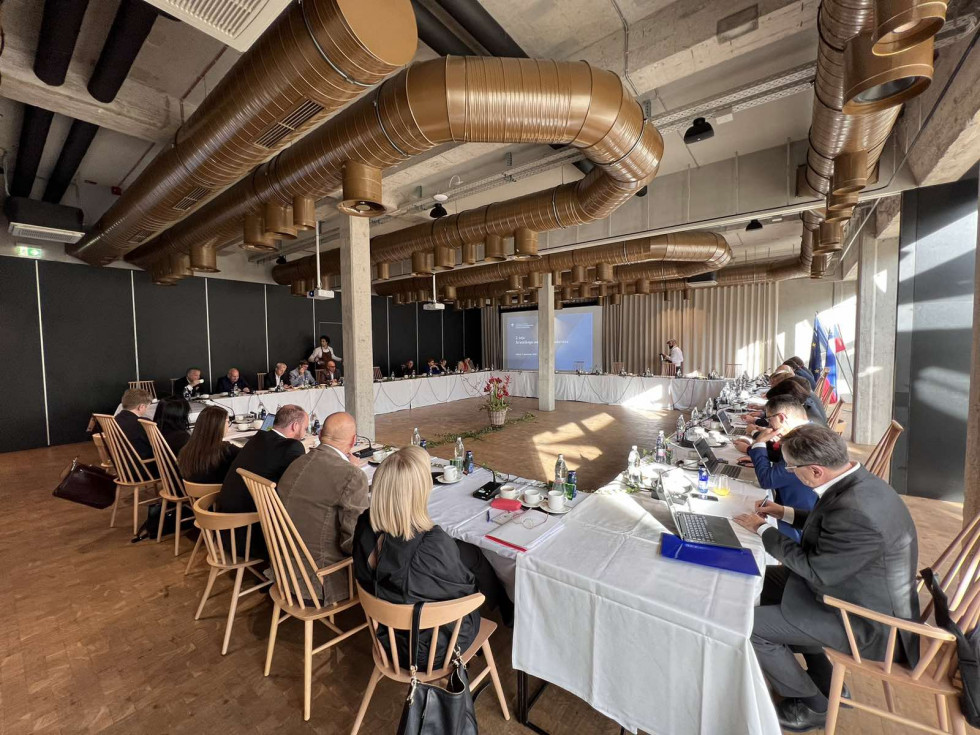Members of the Strategic Economic Council discuss a more stimulating environment for development-oriented companies and jobs
- Ministry of Economic Development and Technology
In the coming months, the Ministry will form working groups comprising representatives of social partners in order to draft specific legislative proposals for individual areas, which will then be presented to the public at the start of public debate.
Minister of Economic Development and Technology Matjaž Han said, “Helping Slovenian companies during the energy crisis is our current priority. At the same time, it is crucial to think in developmental terms. To that end, members of the Strategic Economic Council exchanged views for the first time today regarding how to ensure an even more stimulating and development-oriented business environment for the Slovenian economy, both in terms of incentives for companies in the early stages of development and growth, and in terms of providing the human resources companies urgently need and the appropriate remuneration of workers. Our aim is to provide the Slovenian economy more competitive conditions for the development of companies.”
Support for the scale-up of Slovenian development companies
Council members first exchanged views regarding the opportunities and incentives needed for companies in early stages of growth, i.e. so-called ‘scale-up’ companies with high growth potential. They welcomed the Ministry’s initiative to begin a more structured debate on the support needed for development-oriented companies in their initial phase of operations and development. In their discussions, members emphasised the need to create opportunities for more funding sources, in particular venture capital, for growing high-tech, high value-added companies. In addition, financial support should be more targeted and funds less dispersed, and the return on invested public financial support monitored. A decision will also have to be made regarding which trends and industries will make sense for further investments.
Members emphasised that it is important for the Slovenian economy to ensure that local, highly qualified professionals do not go abroad, while the employment of foreign workers must be facilitated by providing a stable and supportive environment for both the life and work of professionals from abroad. Some members warned that we must provide a development environment for the entire vertical chain of industry, without forgetting about the necessary incentives and a predictable environment for large companies in the traditional sectors of manufacturing, logistics, food and other industries. Those sectors are crucial for the functioning of the economy as a whole and are important business partners for smaller companies, including development companies.
The Organisation for Economic Co-operation and Development (OECD) defines a ‘scale-up’ company as a company with average annualised growth of at least 20% over the last three years and at least 10 employees at the start of that growth. A key feature of those companies is that they have very high growth potential. A study by the World Economic Forum indicated that not all start-ups grow into large companies. Those that have succeeded have brought major changes to society through new technologies and services, and have significantly increased employment. The main difference between a start-up and a scale-up is that a start-up is still searching for a sustainable business model, while a scale-up already has such a model in place. Their main challenge is to manage rapid growth and maintain operational control over a company during the rapid growth phase.
Discussions regarding the conceptual framework for a development jobs act
The Ministry has started drafting a development jobs act, which aims to increase the competitiveness of Slovenian companies in the employment of development workers. Today, the Strategic Economic Council held the first discussions on the conceptual framework for that act.
During their debate, members welcomed discussions regarding the draft act, as companies wish to improve the wages of highly qualified employees. They also pointed out that there is the need for a system that is as simple as possible, that is not administratively complex and that does not allow for the possibility of abuse. Opinions were expressed during discussions regarding the form of incentives, and target segments of companies and jobs.
Discussions regarding the attractiveness of Slovenia for global talent
The Ministry also intends to draw up the legal basis for the employment in Slovenia of highly qualified experts from abroad. Because the corporate sector faces lengthy procedures for employing non-residents, the Ministry presented the idea of a fast-track procedure for the employment of foreign experts. This will reduce the shortage of certain experts and skills in specific areas, and improve the international competitiveness of Slovenian companies.
Members welcomed the intent and direction of proposed solutions. They put forth proposals regarding conditions for companies and employees, and also proposed that a similar system could be set up for foreign students. Faster employment is needed not only for skilled workers, but also for other types of workers at companies that are important for the survival of other companies lacking basic human resources. The conceptual framework will be the subject of further coordination between the Ministry and social partners, and interdepartmental coordination.
Remuneration of workers via profit sharing
The Ministry will also begin drafting amendments to the existing Workers’ Participation in Profits Act to encourage the increased participation of workers in corporate profits. Members of the Strategic Economic Council also welcomed these conceptual solutions, which will be further fine-tuned by social partners and the competent ministries.

